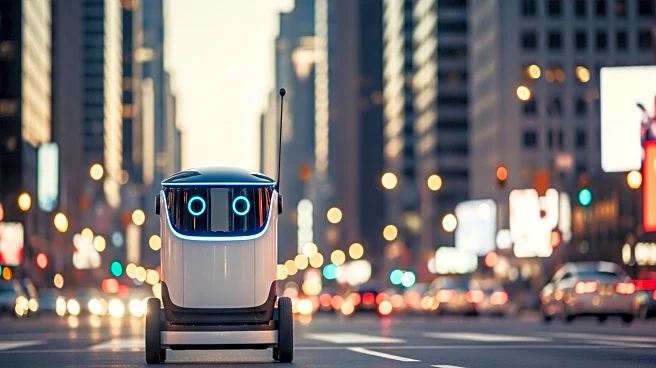What is the story about?
What's Happening?
Food delivery robots, such as those from Serve Robotics, are becoming more common in U.S. cities like Atlanta, Los Angeles, and Chicago. These robots, often named and designed to appear friendly, are used to transport food orders over short distances. Despite their novelty, these robots have faced challenges in navigation and efficiency, often getting stuck or causing inconvenience to pedestrians. While initially a curiosity, the robots have become a regular part of urban life, though skepticism remains about their utility and trustworthiness. Critics argue that these robots are rolled out without sufficient public input, raising concerns about privacy and the impact on local communities.
Why It's Important?
The deployment of food delivery robots represents a significant shift in urban logistics and consumer convenience. While they promise reduced traffic and emissions, their effectiveness and acceptance are still under scrutiny. The use of robots in delivery services could potentially reduce labor costs for companies like Uber Eats, impacting employment in the delivery sector. Additionally, the integration of AI-driven robots into everyday life raises ethical and privacy concerns, as these devices collect data and operate in public spaces. The broader acceptance of such technology could influence future urban planning and regulatory frameworks.
What's Next?
As food delivery robots continue to be tested and deployed, cities may need to develop regulations to address safety, privacy, and operational efficiency. Public feedback and experiences will likely shape the future of these technologies, potentially leading to improvements in design and functionality. Companies may also explore partnerships with local governments to ensure smoother integration into urban environments. The success or failure of these robots could influence the adoption of similar technologies in other sectors, such as healthcare and logistics.
Beyond the Headlines
The introduction of delivery robots highlights the growing influence of AI and automation in daily life, prompting discussions about the balance between technological advancement and human employment. It also raises questions about the ethical implications of surveillance and data collection by autonomous devices. As these robots become more prevalent, society will need to consider the long-term impacts on community dynamics and the potential for increased reliance on automated systems.















